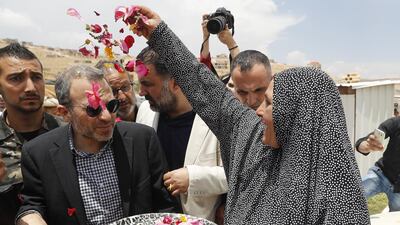The UN refugee agency told Lebanese officials it was unable to encourage refugees in the country to return to Syria given the “complex situation on the ground” after caretaker foreign minister refused to approve new work permits for staff, citing the body’s approach to the matter.
UN High Commissioner for Refugees Filippo Grandi met with Lebanon’s caretaker Foreign Minister Gebran Bassil on Friday in Geneva in a bid to defuse tensions.
“The UNHCR’s position [is] that voluntary repatriation is always the best solution to any refugee crisis and also the preferred choice of refugees when conditions allow,” a statement quoted Mr Grandi as telling Mr Bassil.
He also said that the UNHCR was attempting to create the conditions on the ground to allow the safe and dignified voluntary return of refugees. However, Mr Grandi added that he did not “oppose the return of those who wish to repatriate now and will continue to provide objective and factual information to refugees and to help them be aware of the required documents before leavening”.
Mr Bassil has accused UNHCR of seeking to dissuade refugees from returning to Syria saying that they were using scare tactics, such as raising the possibility of military conscription and continued clashes in many areas of the country to change refugees’ minds. UNHCR has denied the claims but said they have an obligation to ensure refugees are informed of the reality and are undertaking the return voluntarily.
The caretaker minister ordered a freeze on new UNHCR work permits for international staff and threatened unspecified escalating sanctions on the international body if they did not “reverse their position”. After Friday’s meeting, Mr Bassil said he was willing to lift the sanctions if the agency reversed its position.
While in Geneva, the Lebanese official also met with UN special envoy on Syria, Staffan de Mistura, and called on him to speed up a political settlement to the war to allow refugees to return.
There are just under one million Syrian refugees registered with the UNHCR in Lebanon although the government ordered the body to halt registrations from January 2015. Therefore, officials estimate the real number of refugees to be closer to 1.5 million.
Last week, Mr Bassil travelled to the town of Arsal on the northeastern border to meet some of the 3,000 refugees in the border town who had signed up to return to Syria.
During the visit, the caretaker minister met with a local MP and municipality members to hear the needs of local officials as well as groups of refugees to hear about the barriers preventing them from returning. He reportedly encouraged them to look at means to return to Syria rather than looking for resettlement in a third country.
Mr Bassil's move has caused tensions in the caretaker government with sources close to Prime Minister-designate Saad Hariri hitting out at the foreign minister in media interviews. Lebanon's Daily Star newspaper reported on Friday that an adviser to Mr Hariri said the dispute has been an embarrassment to the Lebanese state and the prime minister-designate The source added that Mr Bassil was overstepping his mandate by taking unilateral action without the full support of the entire government.
_____________
Read more
Lebanon's Hariri talks refugees, trade with Putin on eve of World Cup
UNHCR hopes Lebanon's Bassil will unfreeze work permits
Lebanese foreign minister battles UNHCR over refugee policy on return
_____________
Separately, President Michel Aoun met with a delegation from the International Support Group for Lebanon who raised the issue of refugees in Lebanon. After the session, acting UN Special Coordinator for Lebanon Pernille Kardel said that they had discussed the issue of refugee returns and that the support group had reiterated that the “presence of the Syrian refugees in Lebanon is temporary”.
The support group, formed in 2013, brings together UN bodies, the Arab League, EU, Russia, France, Germany, Italy, UK, US and China to co-ordinate international support for Lebanon in handling the Syrian crisis.
Ms Kardel also hinted at the dispute between Mr Bassil and UNHCR, saying: “We agreed on the need to push forward the partnership between Lebanon and its international partners in a constructive and fruitful manner to address this issue.”


